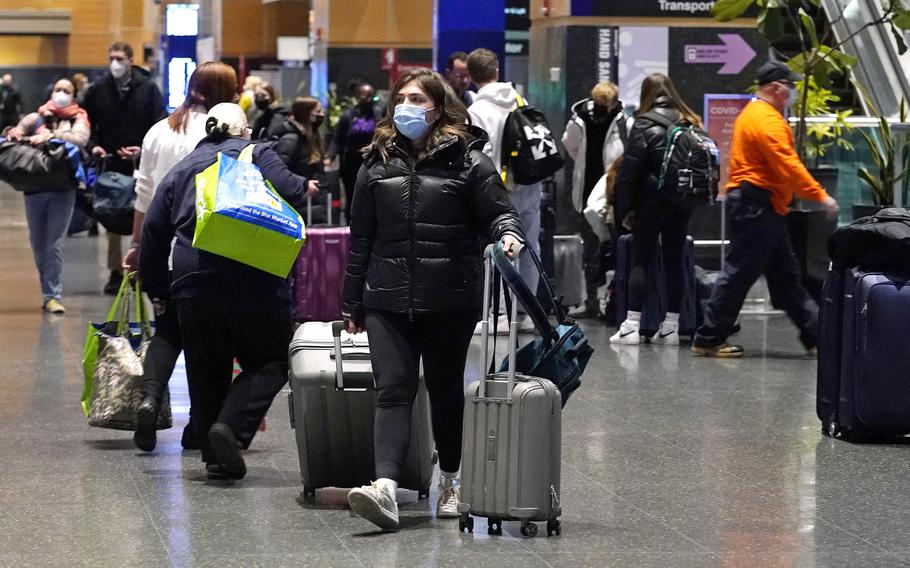
Travelers trek through Terminal E at Logan Airport, Tuesday, Dec. 21, 2021, in Boston. (Charles Krupa/AP)
Flight disruptions stretched into their third week on Friday with snow in the Northeast and Mid-Atlantic, prompting high numbers of flight cancellations in the New York City, Boston and Washington regions.
According to FlightAware, a flight-tracking website, more than 2,600 flights within, to and from the United States were canceled Friday. Southwest Airlines continued to be the hardest hit among major U.S. carriers, with more than 520 flights canceled, roughly 17% of scheduled departures.
At Boston’s Logan International Airport, about 42% of departures were canceled Friday, according to FlightAware. In the New York City area, nearly 200 departures were scrubbed, about 36% of those scheduled. John F. Kennedy International reported more than 130, or 22%, of departures were canceled Friday, while roughly 23% of flights out of Newark’s Liberty International were canceled.
Delays also were reported at three Washington-area airports, which are still trying to rebound from a Monday storm that dumped more than 10 inches of snow in some parts of the region. Reagan National Airport received nearly seven inches of snow Monday, prompting the cancellation of more than 85% of flights that day.
On Friday, there were more than 90 flight cancellations at National, about 21% of scheduled departures, according to FlightAware. At Baltimore-Washington Marshall International, a major hub for Southwest, more than 40 flights, roughly 16% of those scheduled, were scrubbed. Meanwhile, at Washington Dulles International, 12% of flights were canceled.
Among U.S. carriers, Southwest remains the most affected, with more than 500 cancellations, about 17% of Friday’s scheduled departures. Carriers with strong presences in Boston and New York City, including American Airlines, JetBlue and United Airlines, also were affected. JetBlue scrapped 17% of planned departures Friday, while American canceled more than 180.
United, which also has struggled with staffing issues and weather impacts, warned customers whose itineraries included Denver and cities in the Northeast of potential issues via Twitter.
The Chicago-based carrier canceled 208, or 10%, of its scheduled departures Friday.
Airlines have blamed the cancellations on a combination of factors. Initially, staffing shortages due to rising numbers of coronavirus infections caused by the omicron variant forced airlines to reduce their schedules, but those shortages have been aggravated by bad weather in various parts of the country.
The Transportation Security Administration also has seen an uptick in infections. On Friday, it reported 3,503 cases, an increase of 894 since Monday. The rising numbers are beginning to affect the agency’s operations. On Friday, the agency temporarily closed two of the four checkpoints at Phoenix Sky Harbor International’s busiest terminal, Terminal 4, which is home to Southwest and American airlines as well as several international carriers. News of the temporary closure was first reported by the Arizona Republic.
“We are monitoring this closely, and this situation only seems to affect Phoenix Sky Harbor,” said Carter Langston, a TSA spokesman.
During this most recent wave of disruptions, many travelers have complained about waiting for hours on hold to rebook flights or track lost baggage. Airlines have invested billions of dollars in tools to allow customers to rebook flights online or via their smartphones, but many travelers said those tools did not work for their situations.
Henry Harteveldt, an aviation analyst, said those complaints may prompt some airlines to rethink staffing in their customer service centers.
“As great as tech can be, it’s very clear that when problems occur and it’s on a large scale, lots of people still turn to the phone [to call the centers],” he said.
With holiday bookings reaching pre-pandemic levels, airlines had hoped to close out 2021 strong. Analysts said carriers are likely to see some effect from the current spate of disruptions, but airlines will bounce back.
“While high profile, the flight cancellations pose only a temporary problem for the airlines, and the cancellation rate will decline in upcoming weeks,” Jonathan Root, a senior vice president at Moody’s, wrote in a report released this week. “We expect the financial impact of the cancellations to be modest, marginally lowering operating cash flow in these weeks.”
U.S. airlines are scheduled to report fourth-quarter earnings next week.